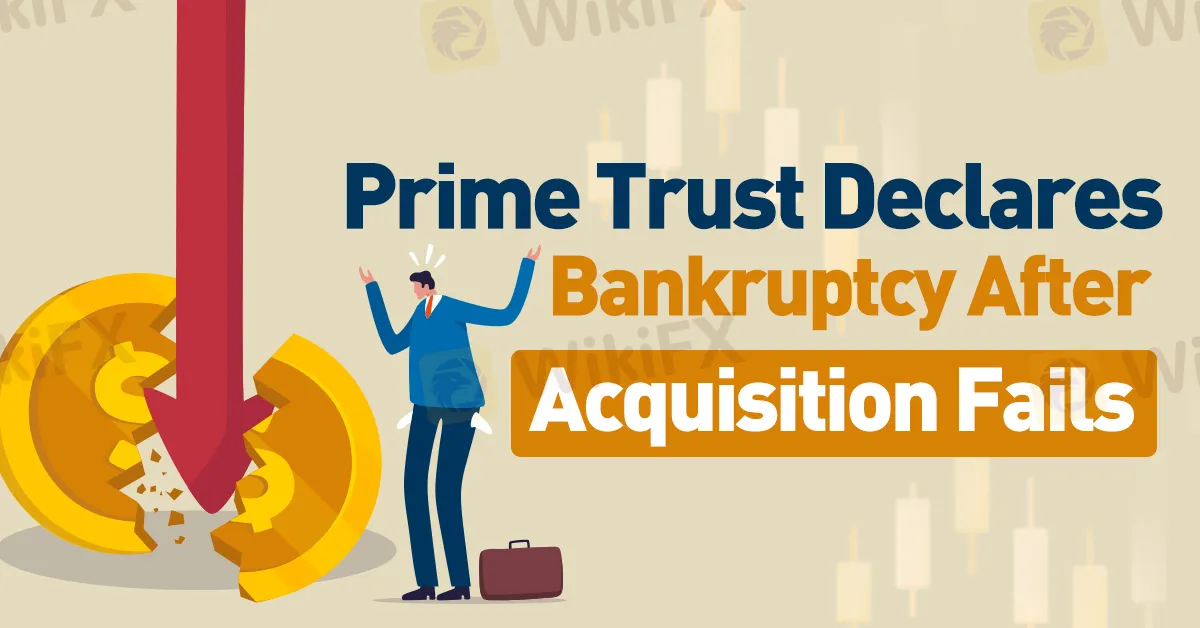简体中文
繁體中文
English
Pусский
日本語
ภาษาไทย
Tiếng Việt
Bahasa Indonesia
Español
हिन्दी
Filippiiniläinen
Français
Deutsch
Português
Türkçe
한국어
العربية
Prime Trust Declares Bankruptcy After Acquisition Fails
Abstract:Prime Trust, a Las Vegas-based cryptocurrency custodian, has taken the step of filing for Chapter 11 bankruptcy protection amidst a series of challenges including regulatory scrutiny and failed acquisition attempts.

Originally founded in 2016, Prime Trust initially garnered acclaim for its blockchain-based infrastructure and APIs tailored for financial institutions. Nonetheless, the company has recently initiated a Chapter 11 bankruptcy proceeding, marking the latest in a series of setbacks for the fintech enterprise, which has encountered a string of challenges over the past year, encompassing regulatory interventions and unsuccessful acquisition endeavours.
The decline of Prime Trust gathered momentum when it was placed under receivership by Nevada regulators in June, a move attributed to the company's insolvency and inability to cater to its clientele. Concurrently, a potential acquisition by its rival crypto custodian Bitgo fell through without elucidation, raising apprehensions about the firm's stability.

In June, Prime Trust's subsidiary Banq filed for bankruptcy due to alleged mismanagement during the tenure of former CEO Scott Purcell. In addition, partner company Abra confronted a cease and desist order in Texas following allegations of securities fraud.
The situation further deteriorated when the Nevada Financial Institutions Division (NFID) intervened, closing down Prime Trust's operations on the grounds of breaching fiduciary obligations and trust laws. Regulators reportedly uncovered instances where Prime Trust had inappropriately utilized customer funds to fulfil withdrawals since December 2021.
“The NFID was actively monitoring the solvency of Prime Trust in anticipation of a potential acquisition or merger,” stated the regulator. “Ultimately, Prime failed to safeguard assets under its custody and cannot meet all client withdrawals. As such, Prime had breached its fiduciary duties to its clients, violating Nevada trust laws.”
The alleged misallocation of funds was exacerbated by the majority of digital assets held by Prime Trust, predominantly composed of illiquid assets instead of more mainstream cryptocurrencies like Bitcoin. Consequently, the company faced escalating financial obligations.
Former President of the Bank of Nevada, John Guedry, has reportedly been appointed to lead the restructuring efforts as a receiver, while Judge Susan Johnson will oversee the bankruptcy proceedings. In the meantime, Prime Trust will continue its operations within the purview of the bankruptcy court. However, the company intends to file a motion to sustain the payment of wages and benefits to its employees during this phase.
Moreover, the cease and desist order prompted other cryptocurrency firms to withdraw their holdings from Prime Trust, generating a ripple effect within the industry. According to Tuesday's statement, Prime Trust is considering strategic alternatives, including the potential divestment of its assets.

Disclaimer:
The views in this article only represent the author's personal views, and do not constitute investment advice on this platform. This platform does not guarantee the accuracy, completeness and timeliness of the information in the article, and will not be liable for any loss caused by the use of or reliance on the information in the article.
Read more

Coinbase Targeted in $20M Extortion Plot After Customer Data Breach
Coinbase hit by hackers stealing customer data, demanding $20M. The crypto exchange refuses to pay, offers reward for culprits' arrest.

Forex or Crypto? A Clearer Look at Two Popular Trading Choices
As financial markets grow and change, two trading areas have gained strong attention: foreign exchange (forex) and cryptocurrency. How do you know which one might be a better fit for your investment goals? Read this article to find out!

BitGo Secures MiCA License, Expands Crypto Services Across the EU
BitGo Europe GmbH has received a MiCA license from BaFin, enabling the firm to offer regulated digital asset services across the European Union, boosting crypto adoption.

Radiant DAO Proposes Compensation Plan for Wallet Losses
Radiant DAO, a blockchain-based lending platform, has introduced a new proposal to compensate users who lost funds due to a wallet approval flaw in late 2024 and early 2025. The issue allowed hackers to take tokens from users’ wallets that had previously given Radiant contracts permission to use their funds.
WikiFX Broker
Latest News
WikiFX “Elite’s View on the Challenge: Dialogue with Global Investment Leaders” Concludes Successful
Plus500 Review 2025: Trusted CFD Broker with Top Features Unveiled
Plus500 Q1 2025: Strong Growth Amid Trade War, Mehta Acquisition
Judge Reviews Sanctions Against CFTC in My Forex Funds Fraud Case
BaFin Issues Series of Warnings Against Unlicensed Financial Websites Exploiting German Consumers
All About BotBro: Unregulated Forex Scam Costs Investors Millions
NCC Bank Review: Expanding Services Amid Regulatory Concerns
eToro Broker Review: Something You Need to Know
RM4.8 Million Gigamax Scandal: Investors Still Waiting for Answers
Spain Cracks Down on €20 Million Crypto Laundering Network Linked to Organized Crime
Currency Calculator


